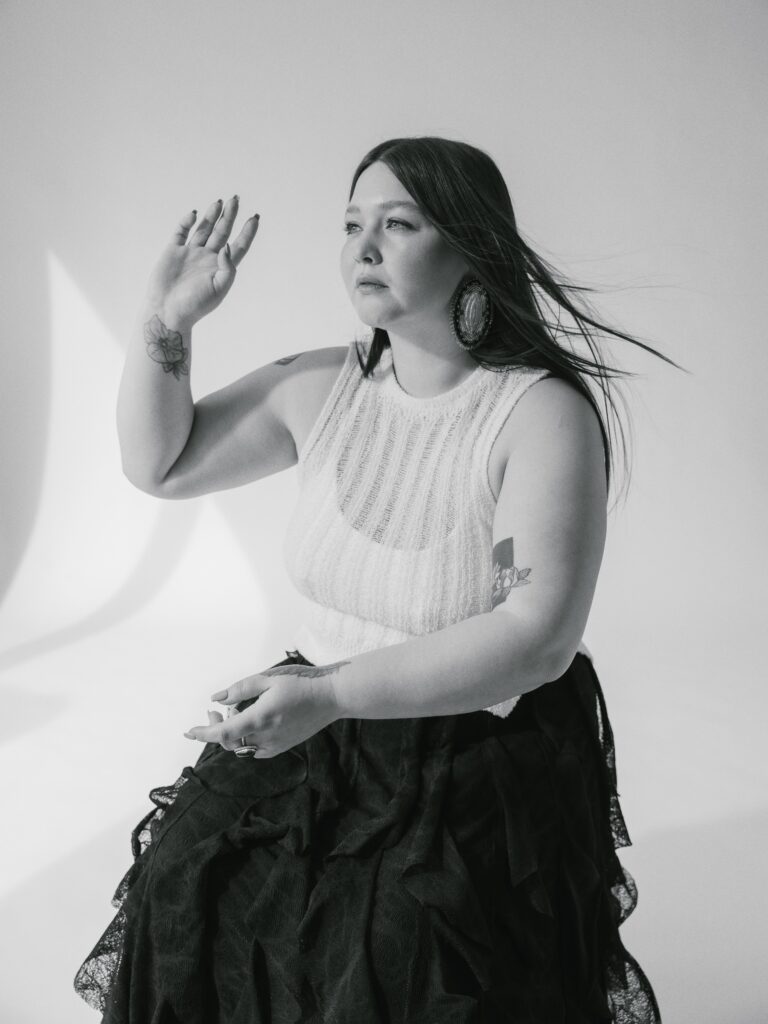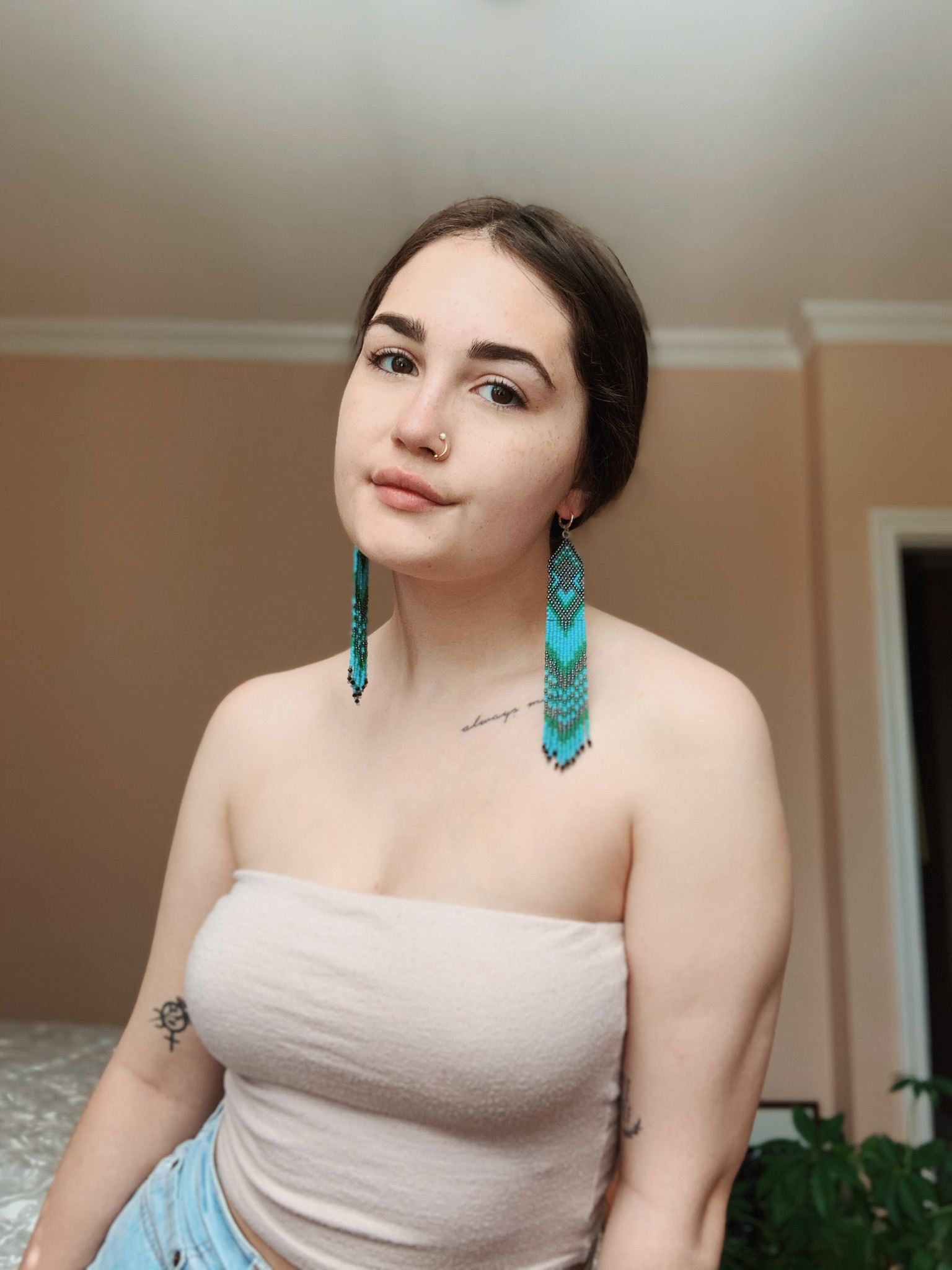For Tahltan and Tlingit artist and producer, Edzi’u, music is a space to honour and confront ongoing legacies of colonization. Their sophmore album, Potlatch In the Box, offers a glimpse into the form and teachings of Potlatch, which was banned in Canada from 1855-1951. Using elders stories, audio interviews, and their ethereal voice, Edzi’u explores an “early imagined world where each different impact of colonization enters into a Potlatch setting.”
Performing nationally for over ten years, Edzi’u powerfully marries voices of the past, present, and future to create textured, bold, and authentic soundscapes. Their innovative sound and soulful lyrics have established a distinct style, which Edzi’u dubs “electronic, alternative pop sound art.”
You talk a lot about heavy subjects in this album, specifically the ban on Potlatch and how this has affected your ancestors, traditions and culture. What was your goal in creating this album, and how do you hope audiences receive it?
My goal is always 100 per cent to create sonic love letters to my people, to represent my family well, and to represent my own thoughts and processes about my experiences. I think many people assume that I’m writing to make a statement for the world. But, I am always thinking about how to balance speaking my truth and also remembering my place within Potlatch.
It’s difficult to balance both sometimes, but I never want to be the voice for everyone or anyone. I’m just speaking from my own experiences, and representing my family in the ways I’ve been taught and raised within Potlatch culture.
I also hope that other Indigenous people can escape into a different reality where our culture and stories are our law and number one, while also processing the experience of being in this reality, like colonial Canada, or wherever folks are listening from.
What type of music did you like growing up, and is it different to now?
I think because I’m also a music producer and produce other artists and have studied composition, I can find something I like of any genre. The music that I grew up listening to was mostly country and a lot of 80s pop rock. Lots of Heart, Fleetwood Mac, The Doobie Brothers, Johnny Cash—that kind of classic northern native-like soundtrack.
I think that Fleetwood Mac is one of my main vocal influences, but I also listen to a lot of RnB music, lo-fi, soul, and of course, pop. I love Jazmine Sullivan, Rihanna, Adele. I want to create every kind of music, so I just try to find ways I can pull elements from every kind of music that I enjoy and cram them together — while also still experiencing the heartbeat of our traditional songs. I’m just a chaotic dreamer who loves to play with sound.
You use audio clips of interviews with Elders and community members in many of your songs. How are your integrated interviews nodding to the mainstream form of voicemail clips, but also stepping outside of this norm?
I don’t use audio clips as a sprinkle on top of a track — I usually centre audio clips. I think mainstream music uses audio clips as more of a kind of ambient grounding. It’s an addition or more of a fine tuning of the message, you know? I use audio clips sometimes as the main voice, not as the setting of the scene.
I just always want to follow the heart of that creative thread that is coming forward. And sometimes that means that I’m going to have a lot of audio clips, and sometimes it means I’m not going to have very many at all. It’s about what pulls my creativity out of me. When I really let myself kind of be a conduit of creativity and feeling, whether it be to something my ancestors or my deeper, higher self is saying, that’s when I have become the most successful.
You said that you were a student at Vancouver Community College for music theory and composition. What was that experience like studying music, while also having ancestral, and community ties to your own form of traditional music?
It was very difficult. I did not feel welcome. I only had a few people who were really on my side, My main instructor and composition mentor, Peter Hannan, was a really big advocate for me. I had a couple of other teachers who really got what I was doing, but the main structure of the school was not supportive of me.
My audition for the degree program included my first album Kime Ani, which uses audio clips of my grandmothers and their drumming. I was told that this wasn’t really music, and I didn’t really know what I was doing. They asked if I had any songs that were more like ‘music.’
Ultimately, I was not accepted into the program. They told me that my grades weren’t good enough,but I knew other applicants with worse GPAs than me that were accepted. It was very disheartening and I cried all summer about it. They told me that I could do a term and try to get my GPA up and then try again. And I thought, “You know what? I’m gonna do that. I’m gonna prove them wrong.”
So, I went back to school for the term, and got straight As in every class, reapplied, and got in. But I really had to fight to be there. I almost didn’t try, but I’m glad that I did. I don’t think I would be in the same place if I didn’t have the chance to do music full-time for a few years.

I saw in Vancouver Sun that you used the words confront and honor to describe how the album approaches the past, present, and future. Can you elaborate on this dualism of honoring and confronting your experience of colonialism?
In the same way that people confront and honor their personal experiences, you need to honour experiences of colonialism. I think of honoring as giving a name to something. This is how I responded. This is what happened to me. I’m naming it, and I’m letting it experience its life.
And then the confrontation is like, “Okay, well, what am I going to do with that experience? How can I transmute this experience into how I’m going to live my life? Is it going to add? Is it gonna take away?” And there isn’t one answer.
I think that a lot of time in Indigenous academics there’s this push around decolonization or Indigenization to create this methodology and one way of doing things. Like, “Here we are, we’ve experienced colonialism and these impacts. This is how we resist.” And I don’t really subscribe to that.
I think that our community is really beautiful and diverse and that everyone needs to experience
how colonialism has impacted them as individuals and also as a community. We need to ask ourselves: What is my own experience, and how does that tie into my community experience? My understanding of my culture is very much everyone has something to offer. Community is also about individual responsibility and contribution.
What has been the most fulfilling feedback or reaction that you’ve received in response to Potlatch in the Box?
I always love when my aunties say they’re proud of me. That’s always my main goal and my favorite feedback. People have also told me it made them emotional. I kind of prefer if people don’t have specific feedback; if it’s making you feel something I’ve achieved my goal.
Edzi’u’s latest release, Potlatch In the Box, is now available to stream on Spotify.




